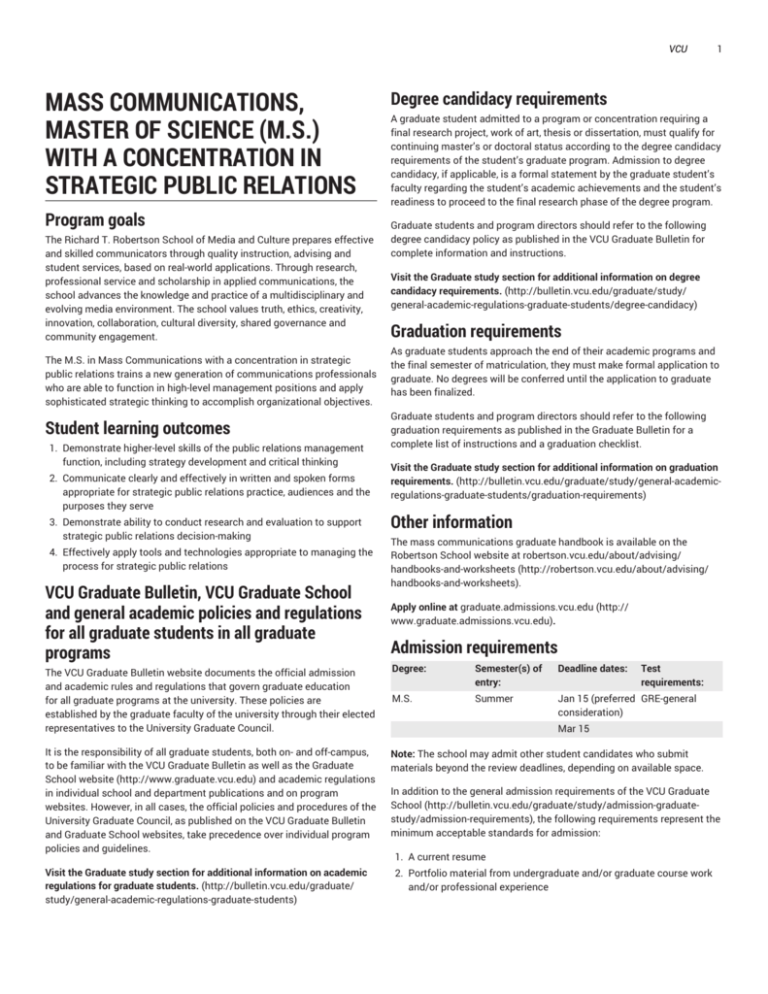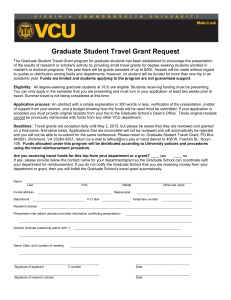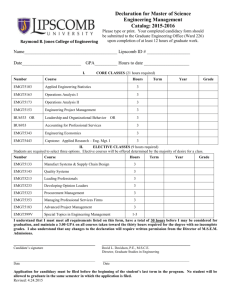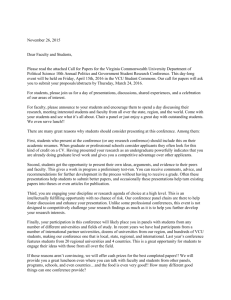MASS COMMUNICATIONS, MASTER OF SCIENCE
advertisement

VCU 1 MASS COMMUNICATIONS, MASTER OF SCIENCE (M.S.) WITH A CONCENTRATION IN STRATEGIC PUBLIC RELATIONS Program goals The Richard T. Robertson School of Media and Culture prepares effective and skilled communicators through quality instruction, advising and student services, based on real-world applications. Through research, professional service and scholarship in applied communications, the school advances the knowledge and practice of a multidisciplinary and evolving media environment. The school values truth, ethics, creativity, innovation, collaboration, cultural diversity, shared governance and community engagement. The M.S. in Mass Communications with a concentration in strategic public relations trains a new generation of communications professionals who are able to function in high-level management positions and apply sophisticated strategic thinking to accomplish organizational objectives. Student learning outcomes 1. Demonstrate higher-level skills of the public relations management function, including strategy development and critical thinking 2. Communicate clearly and effectively in written and spoken forms appropriate for strategic public relations practice, audiences and the purposes they serve 3. Demonstrate ability to conduct research and evaluation to support strategic public relations decision-making 4. Effectively apply tools and technologies appropriate to managing the process for strategic public relations VCU Graduate Bulletin, VCU Graduate School and general academic policies and regulations for all graduate students in all graduate programs Degree candidacy requirements A graduate student admitted to a program or concentration requiring a final research project, work of art, thesis or dissertation, must qualify for continuing master’s or doctoral status according to the degree candidacy requirements of the student’s graduate program. Admission to degree candidacy, if applicable, is a formal statement by the graduate student’s faculty regarding the student’s academic achievements and the student’s readiness to proceed to the final research phase of the degree program. Graduate students and program directors should refer to the following degree candidacy policy as published in the VCU Graduate Bulletin for complete information and instructions. Visit the Graduate study section for additional information on degree candidacy requirements. (http://bulletin.vcu.edu/graduate/study/ general-academic-regulations-graduate-students/degree-candidacy) Graduation requirements As graduate students approach the end of their academic programs and the final semester of matriculation, they must make formal application to graduate. No degrees will be conferred until the application to graduate has been finalized. Graduate students and program directors should refer to the following graduation requirements as published in the Graduate Bulletin for a complete list of instructions and a graduation checklist. Visit the Graduate study section for additional information on graduation requirements. (http://bulletin.vcu.edu/graduate/study/general-academicregulations-graduate-students/graduation-requirements) Other information The mass communications graduate handbook is available on the Robertson School website at robertson.vcu.edu/about/advising/ handbooks-and-worksheets (http://robertson.vcu.edu/about/advising/ handbooks-and-worksheets). Apply online at graduate.admissions.vcu.edu (http:// www.graduate.admissions.vcu.edu). Admission requirements The VCU Graduate Bulletin website documents the official admission and academic rules and regulations that govern graduate education for all graduate programs at the university. These policies are established by the graduate faculty of the university through their elected representatives to the University Graduate Council. Degree: Semester(s) of entry: Deadline dates: M.S. Summer Jan 15 (preferred GRE-general consideration) It is the responsibility of all graduate students, both on- and off-campus, to be familiar with the VCU Graduate Bulletin as well as the Graduate School website (http://www.graduate.vcu.edu) and academic regulations in individual school and department publications and on program websites. However, in all cases, the official policies and procedures of the University Graduate Council, as published on the VCU Graduate Bulletin and Graduate School websites, take precedence over individual program policies and guidelines. Note: The school may admit other student candidates who submit materials beyond the review deadlines, depending on available space. Visit the Graduate study section for additional information on academic regulations for graduate students. (http://bulletin.vcu.edu/graduate/ study/general-academic-regulations-graduate-students) Test requirements: Mar 15 In addition to the general admission requirements of the VCU Graduate School (http://bulletin.vcu.edu/graduate/study/admission-graduatestudy/admission-requirements), the following requirements represent the minimum acceptable standards for admission: 1. A current resume 2. Portfolio material from undergraduate and/or graduate course work and/or professional experience 2 Mass Communications, Master of Science (M.S.) with a concentration in strategic public relations 3. An academic background in public relations (university or professional accreditation program) and appropriate public relations experience Degree requirements In addition to general VCU Graduate School graduation requirements (http://bulletin.vcu.edu/graduate/study/general-academic-regulationsgraduate-students/graduation-requirements), students are required to complete course work in core and elective courses and to conduct significant research. 2. Other: Students take weekend classes (Friday evenings and all day Saturday) as a cohort over four semesters. Continued full-time public relations employment is encouraged during the program. In addition, one of the program’s unique features is a two-week study abroad experience, an expectation of students while they are enrolled in the MASC 683 Strategic PR in a Global Environment. The study tour is led by a full-time faculty member. The cost of the study abroad program is not included in the program’s tuition. Curriculum requirements Course requirements MASC 654 Organizational Communication 3 MASC 671 Strategic PR in a Digital Environment 3 MASC 672 Strategic PR Research and Evaluation 3 MASC 675 Strategic PR Management 3 MASC 676 Public Relations Ethics and Law 3 MASC 682 Strategic Media Relations 3 MASC 683 Strategic PR in the Global Environment (study abroad) 3 MASC 694 Strategic PR Campaign Design and Implementation 3 6 Select from the following recommended electives: ACCT 507 Fundamentals of Accounting ECON 500 Concepts in Economics FIRE 520 Financial Concepts of Management MGMT 540 Management Theory and Practice MGMT 641 Organizational Leadership and Project Team Management MGMT 655 Entrepreneurship MGMT 656 Best Practices in Leadership MGMT 691 Topics in Management (negotiations) MKTG 570 Concepts and Issues in Marketing MKTG 671 Marketing Management MKTG 672 Concepts in Consumer Behavior SCMA 524 Statistical Fundamentals for Business Management SCMA 530 Fundamentals of the Legal Environment of Business Total Hours Graduate program director June O. Nicholson Professor and director of graduate studies, Richard T. Robertson School of Media and Culture jnichols@vcu.edu (804) 257-0251 Program website: robertson.vcu.edu (http://www.Robertson.vcu.edu) 1. Credit hour requirements: This degree requires 30 credit hours beyond the baccalaureate, including six hours of approved elective courses in areas such as nonprofit management and marketing. At least one-half of the credit hours presented for graduation must be at the 600 level or higher. Electives Total graduate credit hours required (minimum) 30 30







